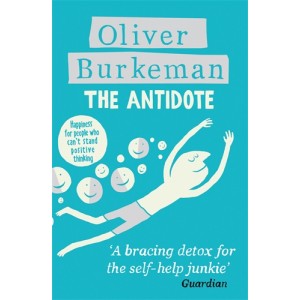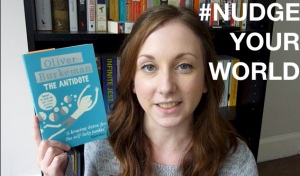
It’s time for the final part of my #NudgeYourWorld adventure for Canongate. I’ve spent the past week reading and living by the learnings within Oliver Burkeman’s The Antidote.
(Click through to catch up on Part I, Part II and Part III.)
Chapters 7 and 8 cover failure and death – but don’t let that put you off!
Chapter 7 – The Museum of Failure
Burkeman opens his treatise on failure with a Japanese term, mono no aware, which roughly translates as ‘the pathos of things’, and a visit to The Museum of Failure. The museum is a supermarket-like space wherein lies a collection of failed products from the US consumer market. Failure is everywhere, but we prefer not to confront it. Burkeman uses examples from the museum to illustrate this point.
Our aversion to confronting failure also leads to a distorted view of causes of success. We under-sample failure in our conversations about success, and this also leads to survivor bias – only hearing about the guys who succeeded, when they share a lot of similarities with those who fail.
The problem is that we now apply the term ‘failure’ to the person whose project failed, not just to the failed project. You’re no longer a person with a failed product, but a failure.
The closest thing I can attribute to this in my life are my current projects. I’m on holiday, but I’m attempting to blog every day. I already missed a couple of days – so in a way, technically failed. But hey, I’ll keep going. Either way, I’ll be careful not to describe myself as a failure. People fail at things, and that’s ok. As I see it, by considering yourself a failure, you fail yourself. As Burkeman says, being a human failure “is a kind of death”. So let’s talk about death.
Chapter 8 – Memento Mori
Now I can’t top Burkeman on his trial with momento mori, for which he travelled to one of Mexico’s most dangerous towns.
As I mentioned yesterday, I listened to part of this audiobook while flying through a thunder storm. The thing is, no-one really believes in her own death. We can go long stretches without considering our own mortality. We do think about death, but usually not the realities of it. Our work, art, wars, everything we do, can be described as immortality projects. We distract ourselves from thoughts of death and use this energy to create something that might outlive us.
As Burkeman’s sources would have it, truly facing mortality beats down external expectations: our fears of embarrassment, failure, and other negatives. He quotes Steve Jobs on remembering that you’re going to die allowing you to avoid the trap of thinking you’ve got something to lose. It’s a virtuous circle: living meaningfully reduces our anxiety about later regretting not having lived meaningfully. Yikes!
Burkeman gives a thought experiment. Imagine you’re old, say 80 years old, and you think back. What will you wish you’d spent more time on, and less time on? I use a similar technique to keep myself moving, ironically enough, towards making my immortality projects. I imagine myself looking back at what I did and what I always meant to do and thinking, “What was I so afraid of?”
And on it goes…
In his epilogue, Burkeman thinks about negative capability – a phrase of Keats’. He says:
Sometimes, the most valuable of talents is to be able not to notice the craving for completeness or certainty or comfort, and not to be compelled to follow where it leads.
That which purports to be the answer to the meaning of life, or the answer to happiness, or the way forward, usually isn’t. You have to work that out for yourself.
Burkeman also offers an interim report, so here’s mine. In this book I found several concepts that I try to live by. Expecting the worst, accepting uncertainty, and being wary of the mindless pursuit of certainty are just a few. Trying to take control in these ways is a bit like swimming against the tide.
Life will carry you where it will, and loosening your grip and making decisions to chart your course can help the process along.
Ultimately, we’re never in control, and learning to make the most of it, rather than fighting against it, makes life a lot more enjoyable.
Huge thanks to Canongate for involving me in the Nudge Your World project. Click the link for more information and to follow along in the coming months.
